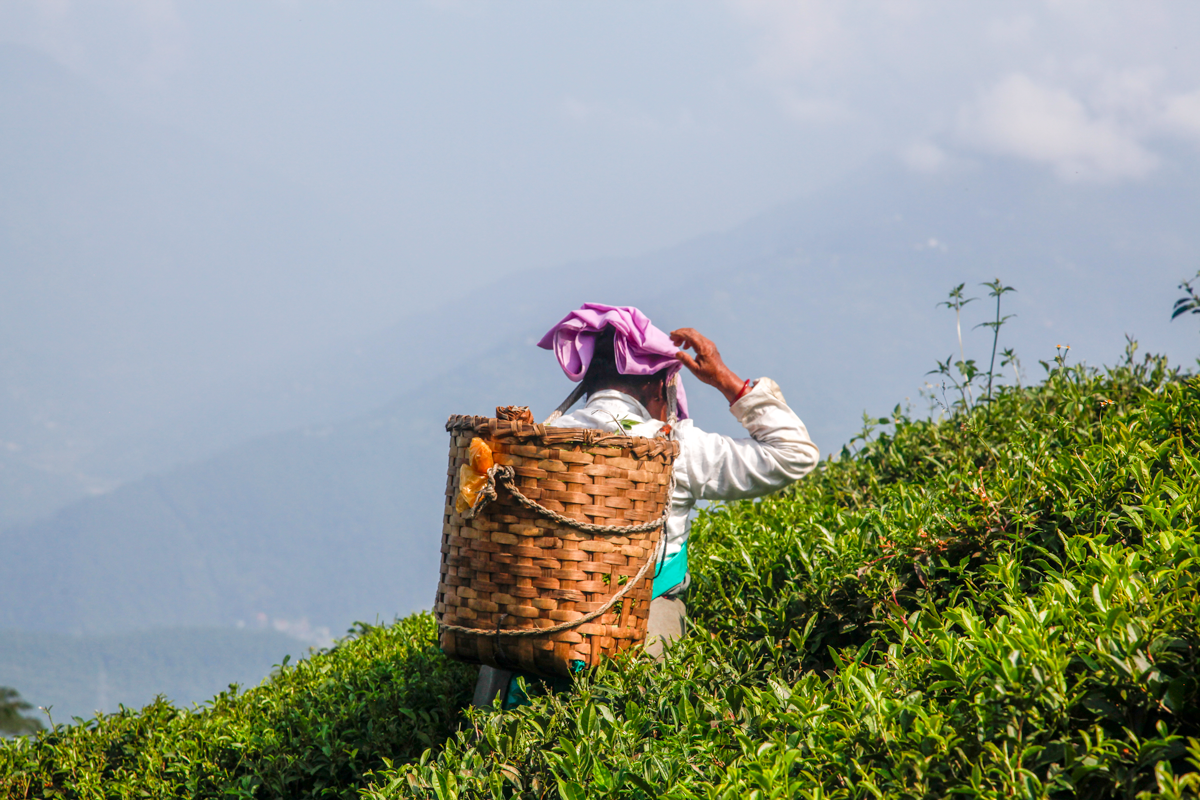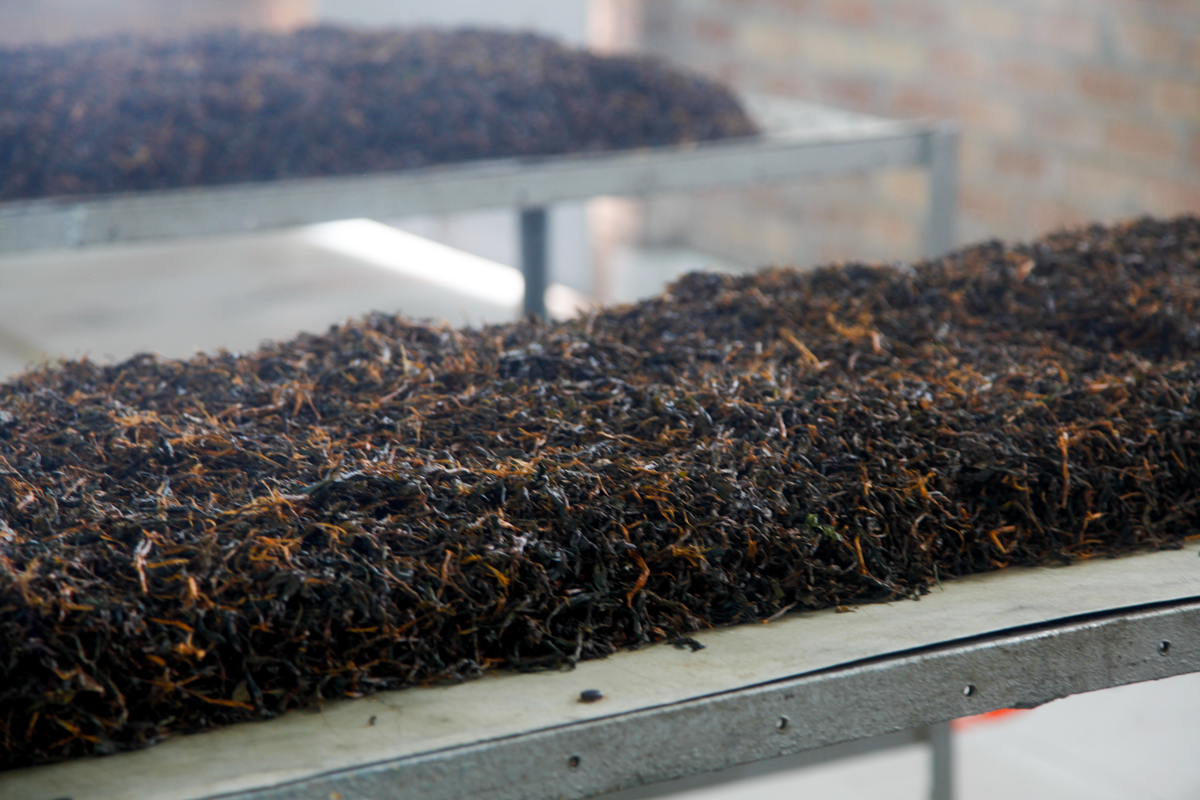These days, it’s often women who pick tea on the plantations established by the British in India, Sri Lanka and various East African countries. But our British friends are long gone. And while the practices they introduced live on in many tea-growing regions, the fact remains that when left to their own devices, like here, between the Ganges and the Brahmaputra, the growers divide up the tasks as they see fit. It’s good to see men in the fields, and it’s good not to hear the same old rubbish about women’s hands being more delicate, more agile. What nonsense! Even the people I’m photographing think it’s a joke. Let’s end 2023 on a high note, and I’ll see you back here next year!
ARCHIVE FOR 2023
Ship ahoy!
On a tea plantation, unless you do everything by hand, from toasting the leaves in a wok to drying them (a truly titanic task), you need an engine to power the machinery. Those lucky enough to visit the Badamtam factory in India are in for a surprise. An authentic antique ship’s engine sits at the back of the building, and has been powering the various tea processing machines for years. Today, the engine gleams like a new penny next to a small Hindu temple. The gods watch over it to make sure it runs smoothly.
It’s all about the people
I love inviting employees to join me on a tea research trip. This is a unique opportunity for me to show the people who contribute to the success of Palais des Thés where tea comes from, how we source it, and who harvests and processes it. Here in Darjeeling (India), for example, they can immerse themselves in the world of tea, in direct contact with the leaves, and understand every stage of their transformation. Above all, they will discover how the work of the tea researcher is all about the people. We know the men and women who live on these mountains – some of them for decades – and we love them. Here, between tasting teas and visiting plantations, Audrey, Camille, Geoffroy, Laurence, Laurie and Marc realise that picking tea is not as easy as it seems.
Tea reporter
Before I started working in tea, more than 36 years ago, I wanted to be a journalist. Since then, I’ve combined this original dream with my work in my own way, through my search for rare teas. I try my hand at reportage with this blog and with my podcast, Un thé, un voyage, which is another way of taking you on a journey.
When I meet villagers living in such poverty, like here, the reporter in me takes over and wonders: does the tea they harvest help them to live, and would they be worse off without it? Or does the tea – poor quality, worth little or nothing – help keep them in this situation?
A Master Tea Sommelier is like a combination of an oenologist, a sommelier and a wine merchant
What does it mean to be a Master Tea Sommelier? A Master Tea Sommelier is first and foremost an enthusiast and expert who loves to share their knowledge. They train their colleagues, educate their customers and work with Michelin-starred chefs, for example. A Master Tea Sommelier knows their teas like the back of their hand – or tongue! From black and green teas to white, blue-green, yellow and dark teas, they know all the techniques involved in making them. The history of tea, its geography, the grape varieties and cultivation methods, the sensory analysis while tasting, the knowledge and mastery of the objects used to prepare tea – nothing escapes them. They know which tea to pair with which dish, and which tea to use in which recipe. A Master Tea Sommelier is like an oenologist, sommelier and wine merchant all rolled into one. To date, Palais des Thés has awarded 53 Master Tea Sommelier diplomas. One of these passionate enthusiasts may work in your favourite store, so don’t hesitate to ask!
(Photo : Louise Marinig)
Master Tea Sommeliers: a shared passion
Once a year, Palais des Thés brings together its Master Tea Sommeliers. These connoisseurs represent the highest level of expertise. They have acquired an impressive amount of knowledge and earned this coveted and demanding diploma. We are proud to dedicate a day to these experts, a day of shared and diverse experiences. Together, we taste teas and celebrate a mutual passion.
(Photo: Louise Marinig)
Small producers and large estates
In Darjeeling, a region I’m particularly fond of and have visited many times, there are large estates built by the British in the mid to late 19th century, as well as a number of small, local producers who own a few acres or collect the leaves harvested by neighbouring farmers. Some work on abandoned plantations. In these cases, the whole family harvests and then processes the leaves using artisanal methods, sometimes with great success. These initiatives include the Yanki Tea Farm and the Niroula Tea Farm.
A lifetime
I will spend my life photographing the people who work with tea. Observing them, loving them, walking beside them, sitting next to them. Paying close attention to their every move. Waiting for the right light. Saying a few words in their language, if I can. Finding things to share. Or just staying silent and taking in all the air I can into my lungs, then even more, and feeling that air circulate around my body.
I will spend my life photographing people looking at me, people blushing or laughing. People who want more, who rush over to see the screen of my camera when I’ve taken a photo. And others who are more distant. I walked behind this woman carrying a full basket for a long time, trying to capture her attention, but she turned her back on me and walked away.
The second nose
One of the trickiest stages in making black tea is achieving the right level of oxidation. The leaves are left to wither for a good ten hours or so, then tossed to bruise them and break down their structure. Then it’s time for the oxidation process, which requires humid conditions. During this stage, the leaves change colour from green to brown. Their aromas also change radically, developing notes of wood, stewed fruit and spices, among many others. When should oxidation be stopped? In Darjeeling, producers use the “second nose” principle. At the beginning of the oxidation process, the tea leaves give off an intense aroma that gradually fades after a few minutes, only to return in full force a while later. This return of aroma is known as the second nose. It signals that it’s time to stop oxidation as the perfect level has been achieved. All that remains is for the leaves to be dried, sorted and packaged.
Strike day
Today, on the eve of the biggest religious festival in the Indian state of West Bengal, workers at this plantation in the Dooars are on strike. They are demanding an increase in their annual bonus, which they use to buy gifts for their family and friends. The bonus is a significant part of their annual salary. Meanwhile, the tea bushes proudly support the bags and umbrellas. A few hours later, having achieved what they wanted, everyone returns to their belongings and the picking resumes.


